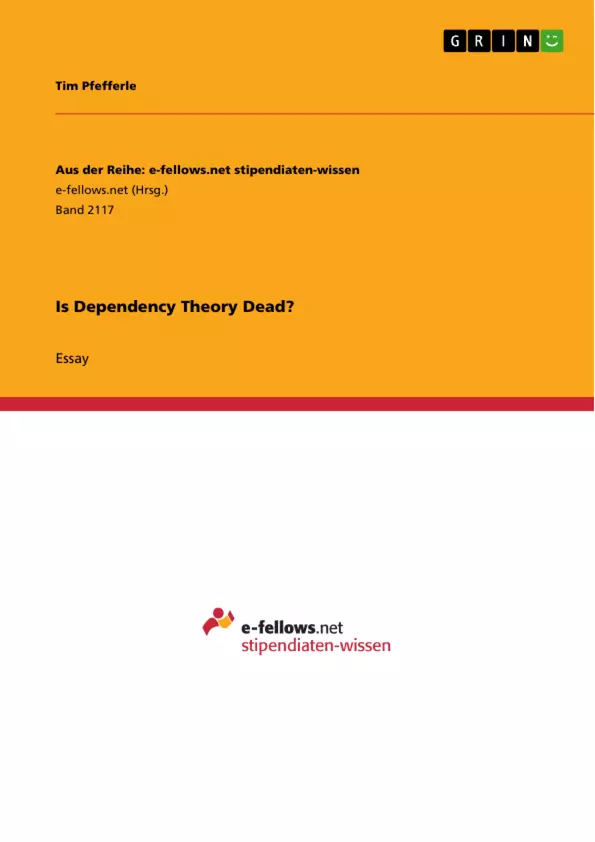This essay outlines the reasons, both conceptual and empirical, why dependency analysis has ceased to have the impact it once did. Subsequently, it will discuss a number of ways in which dependency analysis can still make significant contributions towards an understanding of development.
Today, a cursory search on JSTOR, a popular academic database, reveals that scholarship based on dependency has largely ceased to exist. As Blaney, writing in the 1990s, points out, “discussion of dependency theory proceeds now mostly as post-mortem” (1996: 460). Given its significant role in the 1960s and 1970s, is dependency dead as an analytical approach to development?
Inhaltsverzeichnis (Table of Contents)
- Introduction
- Dependency - what is it and where did it come from?
- The Demise of Dependency
- How Dependency Theory Remains Important
Zielsetzung und Themenschwerpunkte (Objectives and Key Themes)
This essay examines the continued relevance of dependency theory in development studies. It explores the reasons behind its decline in influence and argues that despite its limitations, dependency theory remains valuable for understanding global economic structures, political processes, and contemporary shifts in power dynamics.
- The historical development and core tenets of dependency theory
- Empirical challenges and limitations of dependency theory
- The continuing relevance of dependency theory for understanding global power dynamics
- The impact of dependency theory on alternative development theories and political sociology
- The significance of dependency theory's origins in Latin American thought
Zusammenfassung der Kapitel (Chapter Summaries)
- Introduction: This chapter introduces the central question of development studies and the various explanations offered for economic growth. It highlights the emergence of dependency theory as an alternative perspective in the 1960s, focusing on the exploitative relationship between the global north and south.
- Dependency - what is it and where did it come from?: This chapter explores the origins and diverse interpretations of dependency theory, emphasizing its critique of conventional modernization theories and its focus on structural inequalities within the global economy. It highlights the contributions of key thinkers like Prebisch, Singer, and Frank, and discusses different approaches to dependency analysis.
- The Demise of Dependency: This chapter examines the empirical factors that led to the decline of dependency theory's influence, such as the success stories of Taiwan and South Korea, the rise of China, and the emergence of leftist governments in Latin America. It also discusses the limitations of dependency theory's economistic analysis and its lack of space for agency and autonomous action.
Schlüsselwörter (Keywords)
Dependency theory, development studies, global north, global south, unequal exchange, structuralism, modernization, political economy, institutions, power dynamics, neoliberal governance, Latin America.
Frequently Asked Questions
What is the core argument of the essay "Is Dependency Theory Dead?"
The essay argues that while dependency theory's academic influence declined due to empirical challenges, it remains a vital tool for understanding global structural inequalities and power dynamics.
Why did dependency theory lose popularity in the 1980s and 90s?
Its decline was driven by the economic success of East Asian "tigers" (like Taiwan and South Korea), the rise of China, and criticisms of its overly economistic and deterministic nature.
Who are the key thinkers associated with dependency theory mentioned in the text?
The essay refers to influential figures such as Raúl Prebisch, Hans Singer, and Andre Gunder Frank, who critiqued conventional modernization theories.
What is the "exploitative relationship" described by this theory?
It describes a relationship where resources flow from a "periphery" of poor and underdeveloped states to a "core" of wealthy states, enriching the latter at the expense of the former.
How does the theory remain relevant today?
It provides insights into contemporary neoliberal governance, global economic structures, and the political sociology of development in the global south.
What is the difference between modernization theory and dependency theory?
Modernization theory suggests that all societies follow a linear path to development, while dependency theory argues that underdevelopment is an active product of the global capitalist system.
- Citar trabajo
- Tim Pfefferle (Autor), 2016, Is Dependency Theory Dead?, Múnich, GRIN Verlag, https://www.grin.com/document/340766



